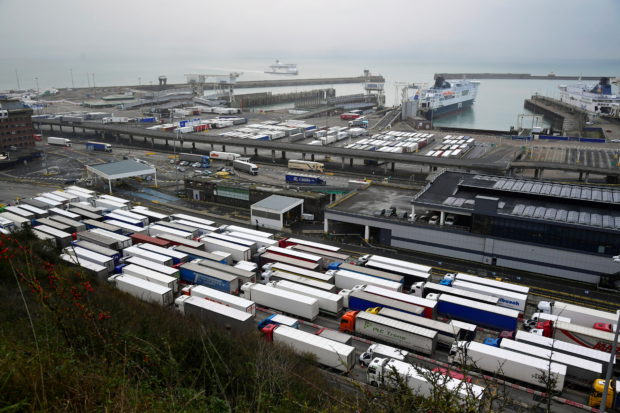
FILE PHOTO: Lorries prepare to enter the Port of Dover to board ferries to Europe, in Dover, Britain December 12, 2020. REUTERS/Toby Melville
BRUSSELS/LONDON -London and Brussels agreed on Sunday to “go the extra mile” in coming days to try to reach an elusive trade agreement despite missing their latest deadline to avert a turbulent exit for Britain from the European Union’s orbit at the end of the month.
British Prime Minister Boris Johnson and the president of the EU’s executive Commission, Ursula von der Leyen had given negotiators a Sunday deadline to find a way to resolve an impasse on arrangements that would guarantee Britain zero-tariff and zero-quota access to the EU’s single market.
On Sunday they mandated negotiators to continue, although Johnson sounded a downbeat note on prospects for a breakthrough.
“Despite the exhaustion after almost a year of negotiations, despite the fact that deadlines have been missed over and over we think it is responsible at this point to go the extra mile,” Johnson and von der Leyen said in a joint statement.
Britain quit the EU in January but remains an informal member until Dec. 31 – the end of a transition period during which it has remained in the EU single market and customs union.
Johnson said the two sides would try to be as creative as possible but Britain could not compromise on key “red lines” so the most likely option was no deal, with trade reverting to the non-concessionary terms set by the World Trade Organization.
A final Brexit without a trade deal would damage the economies of Europe, send shockwaves through financial markets, snarl borders and sow chaos through the delicate supply chains across Europe and beyond.
“Every opportunity to reach a deal is highly welcome,” German Chancellor Angela Merkel said in Berlin.
The two sides have struggled to agree on fishing rights in British waters and EU demands that Britain face consequences if in the future it diverges from the bloc’s rules for fair competition – what it calls a level playing field.
Ireland’s foreign minister, Simon Coveney, said that despite recent comments from the British side, he understood that there was largely agreement on maintaining existing standards.
“I think both sides do want a deal and they want a deal now,” Coveney told national broadcaster RTE. “My view is that a deal can be done, but it really needs to be done within the next few days.”
The EU’s chief Brexit negotiator, Michel Barnier, will brief ambassadors from the bloc on Monday morning about the state of negotiations. The envoys will then review the situation, Sebastian Fischer, an EU spokesman for Germany, which holds the bloc’s rotating presidency, said on Twitter.
TIME RUNNING SHORT
With a succession of deadlines missed, time is now critically short.
“The next days will be important,” the 27 EU member states were due to say in response to the decision to continue talks, according to diplomatic sources in the bloc’s hub Brussels.
EU diplomats told Reuters if there was no time for parliamentary approval by the EU parliament, EU member states could endorse an agreement reached by negotiators to allow for “provisional application”.
The British government has warned that even with a trade deal, 7,000 trucks heading for Channel ports in south-east England could be held in 100-km (62-mile) queues if companies do not prepare the extra paperwork required.
Britain is expected to fast-track the movement of some perishable goods when its transition period ends to help reduce the expected disruption at ports.
FISHING WATERS
The Ministry of Defence said four Royal Navy patrol ships will be ready on Jan. 1 to help protect Britain’s fishing waters in the event of no deal.
There are concerns about possible skirmishes between British and foreign fishing vessels under that scenario because existing rules that give EU boats access to British waters will expire.
European Council President Charles Michel told France Inter radio the bloc would keep its cool.
“I will not say like Donald Trump might that our boats are bigger than theirs, because I try to be serious. On the European side, we will keep our composure,” he said.